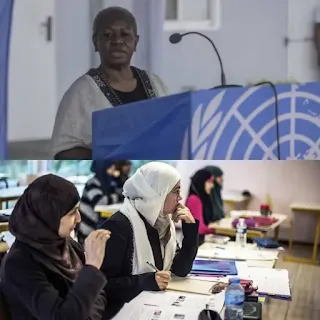The head of the United Nations Mission in the Democratic Republic of the Congo, Bintou Keita, on Monday expressed concern about the growing risk of a “direct military confrontation” between the Democratic Republic of Congo and its neighbor, Rwanda.
Addressing the members of the Security Council, the UN official said: “Unfortunately, the situation in North Kivu has witnessed further deterioration in recent weeks... Regional tensions between the Democratic Republic of the Congo and Rwanda have escalated, which has exacerbated the risk of a direct military confrontation that could also include Burundi.”
During the session, Keita stressed the importance of the current stage that the Democratic Republic of the Congo is going through, with the elections scheduled for this country approaching next week.
It is worth noting that relations between Kinshasa and Kigali have been very tense since the wars that bloodied the region during the last decade of the last century and the first decade of the current century.
Two years ago, these tensions worsened, with the re-emergence of the M23 rebellion (“March 23 Movement”) in North Kivu and its ability to control large parts of the state.
The exacerbation of regional tensions and the increase in violence in general in the eastern Democratic Republic of the Congo comes as Kinshasa called for the acceleration of the withdrawal of the UN force from the country, which numbers about 14,000 soldiers, as of the end of this year.
Kinshasa confirmed that its request to leave this mission comes because of doubts about its effectiveness.
At the end of November, the United Nations Mission (MONUSCO) and the Congolese government agreed on a withdrawal plan that has not yet been announced.
On Monday, the French Ambassador to the United Nations, Nicolas de Rivière, stated that his country, which is in charge of this file in the Security Council, had prepared a draft resolution that “puts into effect this disengagement plan,” pointing out that this draft resolution should be approved before the end of the mission’s mission on December 20 of this year. .
He pointed out that the draft resolution specifically stipulates that, in the first phase, “withdrawal from South Kivu on April 30” will take place, with “the force ceiling being adjusted accordingly.”
In October, the Security Council stressed that the withdrawal of the UN mission from the Democratic Republic of the Congo must in any case be “gradual and responsible.”
It is noteworthy that the Democratic Republic of the Congo is holding parliamentary and presidential elections on December 20, in which current President Felix Tshisekedi (60 years old) is seeking to win a second term.
Alleging that it conflicts with the values of the Republic, stopping funding for the largest Islamic school in France
The French Interior Ministry decided to stop funding the largest Islamic secondary school in the country, claiming that its teaching practices conflict with the values of the Republic.
France intends to stop funding the country's largest Islamic secondary school, due to what it describes as "administrative failures and questionable educational practices."
Ibn Rushd Private School is the first Islamic secondary school that opened in 2003 in the city of Lille, northern France. It has contracted with the state since 2008, and more than 800 students study there.
Students follow the French educational curriculum, in addition to receiving lessons in religious education.
But the local office of the Ministry of the Interior said in a report issued last October that the school suffers from “administrative and financial deficiencies” and that some of its teaching practices are “incompatible with the values of the French Republic.”
In this regard, Eric Dufour, director of the Ibn Rushd School, said that he had not yet received notification from the local office of the Ministry of the Interior, but the school intends to appeal the decision before the Administrative Court.
“When it comes to the values of the republic, we do more than any other school,” Dufour said last week, after he was summoned to attend an education committee meeting in late November, which left him fearing a decision to terminate the school’s contract.
The Ministry of Education's 2020 inspection report confirmed that "there is nothing in the observations, that allows us to believe that teaching practices do not respect republican values."
In recent years, France, a country with one of the largest Muslim minorities in Europe, has implemented a systematic campaign of harassment targeting Muslims, making them more vulnerable to abuse.






Good
ReplyDelete